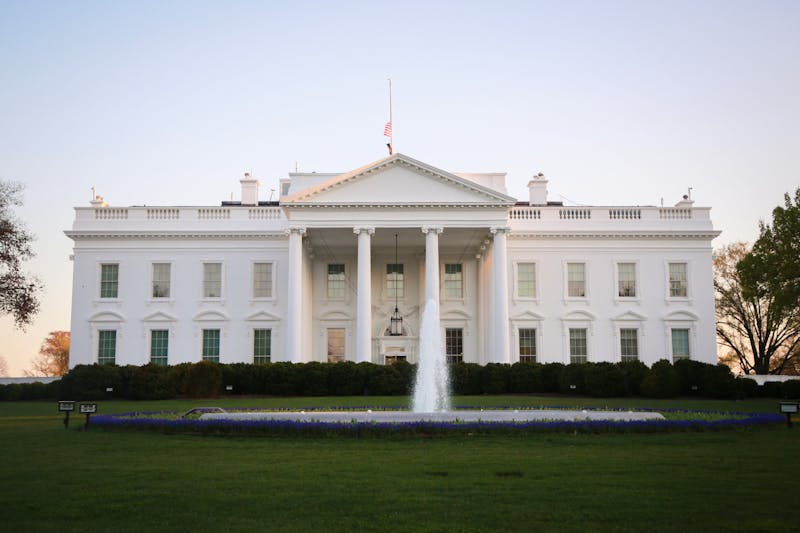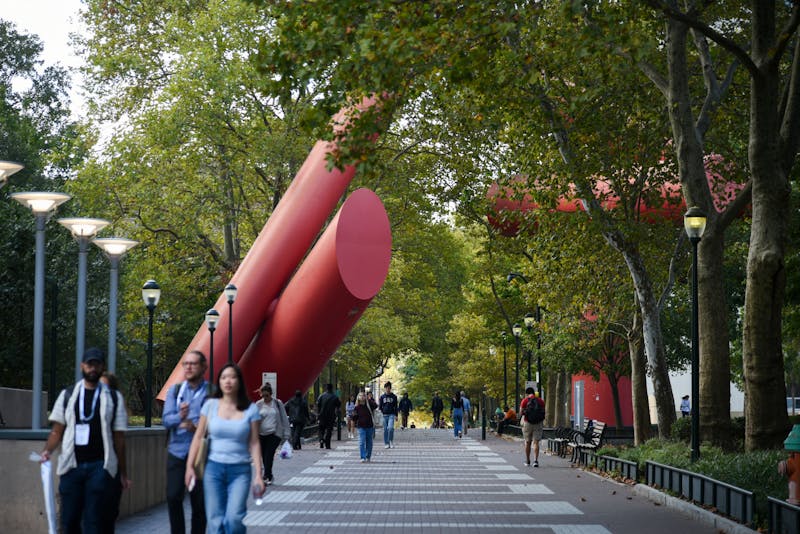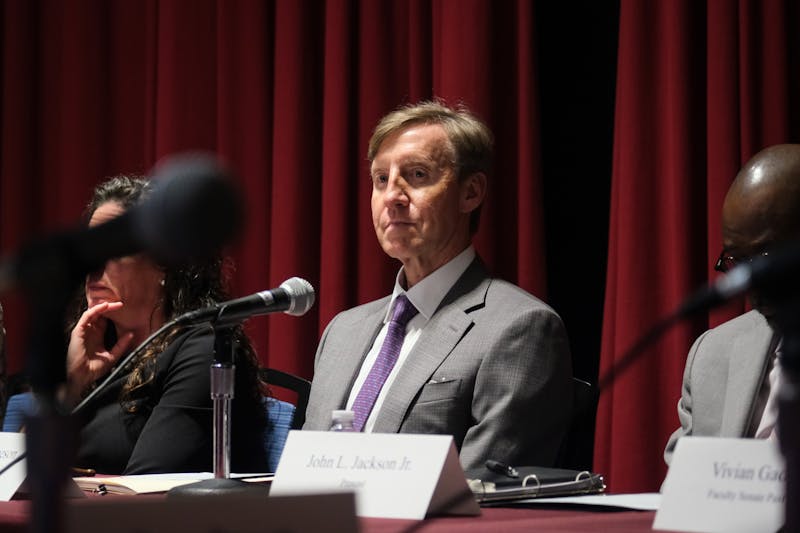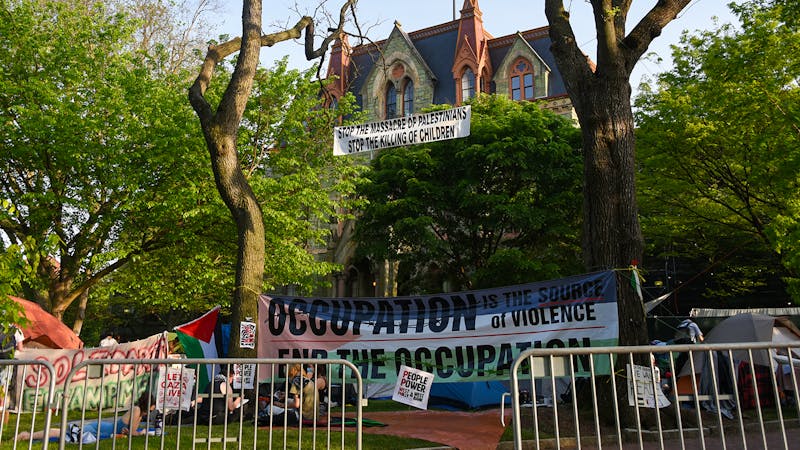
The Presidential Commission on Countering Hate and Building Community published their final report on May 30.
Credit: Abhiram JuvvadiThe Presidential Commission on Countering Hate and Building Community submitted its final report to Interim Penn President Larry Jameson, issuing recommendations addressing areas including campus culture, University values, and academic programming.
The report was shared in an email to the Penn community on May 30.
Former Penn President Liz Magill initially established the Commission in November 2023. The Commission — created alongside the University Task Force on Antisemitism — aimed to address the connections between antisemitism, Islamophobia, and other forms of hate, discrimination, and bias on campus.
Here are five key takeaways from the suggestions outlined in the Commission’s final report.
1. There is a campus culture at Penn that prevents transparency and accountability
In the introduction of the report, the Commission stated that “Vigorous debate about these and other controversial topics is a fact of university life, and perhaps even the point of higher education.”
However, it found several cultural issues on campus prevented productive dialogue on contentious issues from happening.
The Commission wrote that they found community members were “fearful of bullying, doxing, and potential job loss due to expressing their beliefs and opinions.” This resulted in a “fear of negative consequences from their peers, colleagues, or the University’s administration.”
The group recommended Penn reassess campus safety and discipline practices. This included reviewing the Division of Public Safety’s consultation process and “reexamining existing disciplinary cases as appropriate.”
Centralized options to report concerns about Penn’s institutional values should be established, the Commission suggested.
“Reports should be considered through an educational and restorative process, rather than punitive,” the group wrote. “Transparency should be upheld. In cases where this is not possible, the Penn community should be informed.”
The report emphasized the need for better communication from the University to the greater Penn community as a broader suggestion to improve campus culture. The Commission’s findings indicated many felt the University’s leadership was not “open” or “forthright” in their communications, which prevented a “culture of transparency.”
2. The University must clarify where its values lie
The report noted Penn’s lack of clarity on its values, including freedom of expression and belonging, as an issue in their findings.
The Commission found community members felt “each time external voices like donors, alumni, or politicians suggested that Penn patrol the speech of faculty or students, limit their action, or instate punitive measures against them, it threw into question the University’s support for open expression and academic freedom.”
While the group noted that the Commission was “not tasked with recommending substantial revisions to the University’s open expression and/or disciplinary policies,” the report provided a plethora of recommendations on the topic in its final report.
Among the recommendations was a suggestion for the University to reaffirm its “long-standing and firm commitment” to the Guidelines on Open Expression. Additionally, the Commission proposed that an accessible version of the guidelines should be provided to the University community highlighting key clauses, including that the Guidelines protect speech that might be uncomfortable “or even offensive” to some members of the Penn community.
The Commission also recommended Penn adopt a University-wide values statement that “should rest on a broad commitment to open expression and academic freedom.”
3. The University’s academic programming should be updated to reflect Penn’s values
The Commission provided several recommendations focusing on curricular and academic changes Penn should make.
This included revising New Student Orientation programming to emphasize “becoming a Penn citizen,” understanding Penn’s values and open expression policies, and participating in “productive dialogue across differences.”
A required first-year seminar course focused on productive dialogue on a challenging topic — such as war ethics, reproductive rights, or free speech — was also proposed. Additional courses including an SNF Paideia-enhanced course and a class titled “Historical Legacies and Current Controversies” were recommended as undergraduate electives or requirements.
The group also suggested establishing a Distinguished Visiting Professors Program focused on promoting dialogue across differences, with the example of “an Israeli and a Palestinian/Arab” being given as a possible pairing for two faculty members to come to Penn in the same semester.
4. Penn needs to create more spaces — physical and intellectual — to protect dialogue and combat hate
In their recommendations, the Commission highlighted the need for Penn to create spaces that foster open dialogue on sensitive issues and offer community members support and resources.
This included a proposal to establish new cultural spaces on Campus, specifically a Middle East and North Africa cultural space. The group advised the University to continue “evaluating existing physical spaces and adding new ones as deemed necessary.”
The Commission also recommended Penn establish a Center for the Study of Hate and Intolerance “focused on the causes and consequences of hate and intolerance.” It suggested the Center engage with the public, policymakers, government officials, and law enforcement through “scholarly inquiry, teaching, research, and public outreach.”
Additionally, the Commission proposed Penn establish Regional Research Centers focused on languages and cultures to “build Penn’s prestige in these research areas” and “act as first responders in response to disruptive world events.” It specified the University should house these centers under the Provost’s office rather than as Title VI programs, and Penn should “ensure the financial health of all RRCs and identify key sources of funding to support this.”
5. Hierarchies within the University contribute to competition and isolation
Organizational structures within Penn hindered “inclusion and understanding,” according to the Commission’s report. In their investigations, the group found “the existence of a clear hierarchy among community members on Penn’s campus” contributed to faculty, staff, and students feeling “unheard or undervalued.”
The Commission suggested Penn should re-evaluate the current structure of “silo[ing]” and decentralization and make “equitably supporting students, staff, postdoctoral scholars and faculty” a top priority.
The group also recommended the University improve coordination across schools, specifically to remove financial barriers that exist when working across schools and to enable undergraduate students to take courses in any school.
The Daily Pennsylvanian is an independent, student-run newspaper. Please consider making a donation to support the coverage that shapes the University. Your generosity ensures a future of strong journalism at Penn.
Donate











